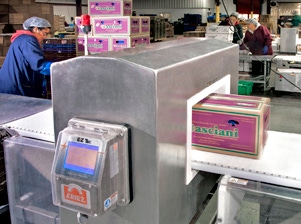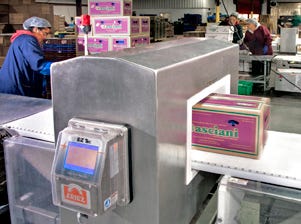March 11, 2015


Metal detector
Since 1925, four generations of the Basciani family have contributed their talents to make Basciani Foods one of the largest commercial mushroom harvesting and processing centers in the country. Mushrooms are Pennsylvania's largest cash crop-almost 500 million pounds of the fungus are grown in the Keystone State-and Basciani is doing its share with a sprawling complex in Avondale, PA.
Mushrooms have become a staple of the American diet as more than one billion pounds of mushrooms are cooked, sautéed, grilled or otherwise enjoyed across the country on an annual basis. Basciani has helped put some additional spotlight on mushrooms over the past few years; The company has been featured in segments on The Discovery Channel's show "Epicurious" and "America's Heartland" on PBS.
Although Basciani's main mushroom farm is located in Avondale, the company has other satellite processing operations in Chicago, Minneapolis, Orlando and Independence, LA, according to plant manager Fred Recchiuti. From these facilities, Basciani ships 1.5 million pounds of freshly-harvested mushrooms per week to its hundreds of foodservice and retail customers.
The process of growing and harvesting mushrooms is an art as much as a science. Proper production requires old-fashioned handpicking and sorting as well as advanced technological equipment, including Eriez E-Z Tec DSP metal detectors, which are used at all the Basciani facilities.
Basciani takes special pride in the fact that its total quality assurance/HACCP scores are consistently in the upper 90 percentile range. "We've added several metal detectors to our bulk and retail packaging lines over the last 10 years because of our growth. We need to make sure the products meet the critical control points and are 100 percent safe right before they are shipped to the end user," Recchiuti says. "The Eriez E-Z Tec metal detectors play an important role in that process."
Sterile environment is a must
For Basciani, perfect mushrooms come from a meticulous process. A special compost made of horse manure and hay goes through a pasteurization stage; the compost is steamed cooked so the growing environment becomes sterile and free of impurities. The pasteurization process takes up to two weeks, with temperatures inside the compost chamber reaching 150 deg F. The compost is tilled weekly, and water is added to create a moist and rich growing environment.
The prepared compost is then seeded with tiny cultural fungus called spawn, which grows and becomes mushrooms. The entire growing cycle from compost pasteurization to harvesting can take up to 15 weeks, according to the company.
Once they reach maturity, the mushrooms are picked and hand-sorted. The harvested mushrooms are then washed, immediately moved to a cooler and subsequently placed on either a bulk or retail packaging line, depending upon their destination. The boxed product is then placed in refrigerated trucks and delivered to the markets within 24 to 48 hours after harvest.
"The bulk lines are designated for our foodservice customers, which include national restaurant chains such as Olive Garden, Ruby Tuesday, Outback Steakhouse and many more. We also sell to national pizza chains," Recchiuti says. "The retail lines are mostly for supermarkets and other consumer outlets."
New level of product purity
Attention to foreign material prevention is a mainstay at every Basciani facility. At the Avondale farm, every container conveyed over five bulk packaging lines or two packaging lines moves through E-Z Tec DSP metal detectors before leaving the facility to ensure the fresh produce is free of metal contamination.
According to Recchiuti, metal contamination can work its way into the processing stage while the mushrooms are being sliced before packaging. Minute metal fragments may be undetectable to a line worker, but can be caught as the packages are moved through the metal detectors stationed at the end of each processing line.
"While the mushrooms are getting sliced, they go through hundreds of rotating razor blades," Recchiuti observes. "Foreign objects like a stone or nail can cause the razor blades to break, leaving some fragments in the sliced mushrooms. That's why all boxes go through the metal detectors to make sure we are meeting those critical control points and to make certain the product is safe."
The E-Z Tec DSP model is particularly useful in harsh environments because of its stainless steel design. The oscillator and receiving coils are wound on a rigid frame and encapsulated in a stainless steel shell (USDA/FDA and Candian Standards Association approved material). The control is housed in a water-tight, dust-tight and corrosion-resistant stainless steel enclosure. This is especially important at Basciani where a high level of moisture is present during the harvesting and processing stages.
Recchiuti also says he is impressed with the ease of operation and set-up with the touchscreen interface on the DSP model. The 4 x 5 in. wide-angled control with backlit screen allows the user to quickly make changes without having to scroll through different menus. Numeric data and value entries are made through the on-screen keypad.
The DSP model also offers calibration verification, reject confirmation and quick recovery after detection of tramp metal. The compact cabinet design allows for installation where space is at a premium.
For Basciani, one consideration in purchasing the E-Z Tec metal detectors was the value-added support offered by its local Eriez sales representative, Steve Hilliard of PennQuip Inc. Hilliard included start-up assistance and training to Basciani personnel as well as follow-up visits for additional product set-ups.
Eriez, 814-835-6000. www.eriez.com
PennQuip Inc., 215-646-3331. www.pennquip.com
About the Author(s)
You May Also Like


